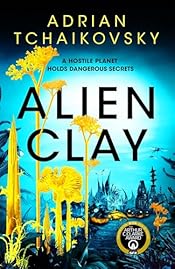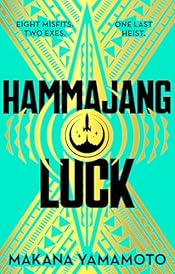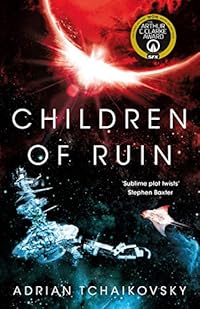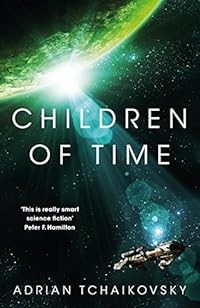Alien Clay by Adrian Tchaikovsky
Posted in My ParSec reviews, Reading Reviewed, Reviews published in ParSec, Science Fiction at 12:00 on 9 October 2025
Tor, 2024, 396 p. £10.99. Reviewed for ParSec 13.

Arton Daghdev was once a professor of ecology. (No-one can pronounce his surname. Don’t worry about it: he doesn’t.) We first meet him when he’s emerging from suspended animation and plunging from a disintegrating spaceship to the surface of Imno 27g, one of the eleven exoplanets humans have so far set foot on. It is known as Kiln and is thirty years from Earth. That’s how long the voyage took and how long it would take to get back. Arton is not going back. That ship was a fragmentation barge: deliberately designed to break up on arrival. He is a convict at the end of a one-way voyage and hopes to avoid being Acceptable Wastage either during the drop or once (if) he survives it.
Back on Earth he had taken part in a plot against the Mandate which rules there, an autocracy which brooks no opposition and wants black and white answers to complex questions, everything sorted into predetermined boxes. He had managed to escape capture for a year before being betrayed.
On arrival on Kiln he can’t help noticing the strange ruins, obviously built artefacts, which dominate the landing site’s surroundings. Brought to Commandant Terolan, his first question is, ‘Who built them?’ Prisoners with scientific expertise are prime candidates for trying to find its answer. But this is still a prison camp. That interview plus his year’s delay in arrival compared to his fellow conspirators means he will be subject to extreme suspicion by his fellow inmates. They can’t know if he betrayed them; or he if they betrayed him. Transportation to Kiln is above all a punishment. (It can’t be hell without fellow sinners to suffer amongst.)
Only Staff on Kiln have the best of what is on offer. The prisoners are divided up into Dig Support, General Labour, Excursions and Maintenance and supplied with only the products of shoddy printers, and recyclers processing just about everything, to sustain and protect them.
Excursions have the short straw, three-day sojourns into Kiln’s interior to investigate other ruins sites before being extensively and painfully decontaminated on return. Kiln’s biology is invasive and possibly deadly, a riot of parasitism and symbiosis run rampant, evolution on show in real time, adept at picking the locks of human biology and prising a way in. The howls of Ylse Rasmussen, infected by Kiln and kept in a cage like the mad woman in the attic, are warning enough to take care. Though with superficial resemblances to Earthly counterparts, organisms on Kiln are scarcely taxonomisable, latching on to each other as and when needed to perform any required function. “Kiln tissues spread throughout the body, with less reliance on discrete organs.”
Arton’s voice, self-deprecating, knowledgeable, humane, is a crucial part of this novel’s success. His tale is interspersed with ruminations on his situation and the Mandate’s justifications. “Human history is full of social conventions designed to salve the consciences of the mighty and curb the ambitions of the small. So we invent philosophies to tell us we were right to do what we did and we’re allowed to do what we want. Science, the science they” (the Mandate) “choose gives them their legitimacy.”
Arton will have none of that. He believes “Science, as a creed, should care about truth. It shouldn’t be bent for political aims. No group of people is naturally inferior, none has an innate ability to lead. We share the vast majority of our genetic inheritance with mushrooms.”
Arton’s fall from grace with the Commandant sees him deployed on Excursions and disaster strikes – as we knew it must sooner or later. His group is forced to trek back to the camp for days subject to whatever Kiln can throw at them. In the alienesses here there are faint echoes of David Lindsay’s Voyage to Arcturus and Ian McDonald’s Chaga but Alien Clay is – unlike the creatures on Kiln – a thing only unto itself.
The infiltrations of Kiln biology into his group, the changes those bring about, cause Arton to reassess what he thought of evolution before he got there. It isn’t a boxing match, with the bigger and stronger prevailing: because you need everything else in order to survive. That’s how biology works. On Kiln evolution has demonstrated that.
Alien Clay is Science Fiction doing what it does best. It necessarily has overlaps with other tales set in a penal colony – or any colony – but its resolution absolutely depends on its Science Fictional element.
The following did not appear in the published review.
Pedant’s corner:- intermittent sprinklings of USian among British usages; eg ‘handed my ass’ but then ‘the maths’. Otherwise; “the welcoming committee are keen,” (strictly, ‘is keen’,) “the main body of my admissions class are being shown the ropes” (strictly, ‘is being shown the ropes’,) “the hoi polloi” (x 2. Strictly, since ‘hoi’ means ‘the’, it’s just ‘hoi polloi’,) “A knot of people shove” (a knot shoves,) Parrides’ (Parrides’s,) “had showed me” (had shown me,) “regular spiders” (they did not occur at intervals, they were conventional; similarly with ‘a regular fire, cave man style’, the fire did not go on and off on its own.) “There are a handful of” (OK it’s idiom, but strictly, ‘There is a handful’,) “there are a range” (there is a range,) “the tech team are working” (is working,) “None of us are” (None of us is.) “Everyone in the camp holds their breath” (breaths.) “None of us have any solid way” (None of us has any.) “When pause to eat” (When I pause to eat.) “None of them particularly want to go” (None … wants to go.)
 Issue number 13 of ParSec magazine
Issue number 13 of ParSec magazine  Hammajang Luck by Makana Yamamoto
Hammajang Luck by Makana Yamamoto
 Once again my post contained books from ParSec magazine.
Once again my post contained books from ParSec magazine.

